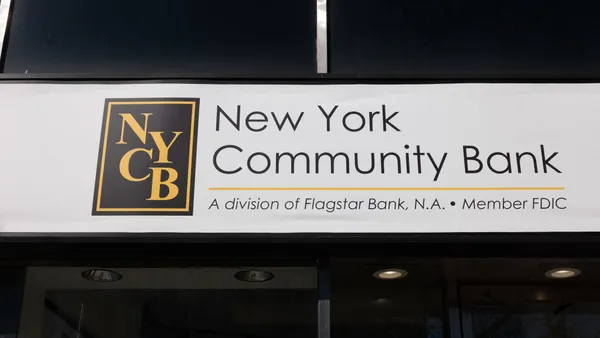Dive Brief:
- Pathward Bank has agreed to pay about $700,000 in refunds and penalties stemming from an investigation conducted by the New York Attorney General’s Office that revealed the bank unlawfully froze customer accounts and illegally transferred money to debt collectors.
- Pathward cooperated with the investigation and voluntarily began remedying its practices last year, according to a Wednesday release from NY AG Letitia James’s office. “We are updating our procedures and are confident that similar issues will not occur going forward,” a Pathward spokesperson said in an email. “We empathize with customers adversely affected and will work hard to regain their trust.”
- The bank will refund $79,664 plus interest to about 88 New Yorkers who had funds turned over to debt collectors. Pathward is also ordered to pay a penalty of $627,000 for its “illegal and deceptive conduct,” according to the release from James’s office.
Dive Insight:
New York law bars debt collectors from acquiring funds that include certain government benefits, such as Social Security or veterans' benefits, or disability and unemployment insurance, worth up to $3,425. State law also keeps banks from freezing accounts with protected wages, which is 240 times New York’s current minimum wage, according to the release from James’s office.
The NY AG’s investigation found that Sioux Falls, South Dakota-based Pathward “regularly sent debt collectors funds that were government benefits or that should have been subject to the protected wages threshold.” From 2016 to 2022, Pathward illegally froze some 1,400 accounts belonging to New Yorkers, James’s office said in the release.
Pathward, a frequent banking partner to fintechs, was formerly known as MetaBank before changing its name in 2022. The bank issues debit cards, prepaid cards, payroll cards and gift cards, mainly through third-party servicers, and holds the funds loaded onto those cards. Several Pathward servicers market their products to unbanked or underbanked consumers, the settlement agreement said.
The investigation determined Pathward “repeatedly instructed its third-party servicers to illegally freeze accounts and turn over consumers’ funds to debt collectors,” in violation of state law. After 2020, Pathward failed to supervise its third-party servicers, resulting in “hundreds of additional illegal account restraints,” James’s office said in the release.
Banks’ third-party relationships have faced more scrutiny of late; last month, the FDIC said it entered into consent orders with Piermont and Sutton banks over alleged deficiencies in the lenders’ banking-as-a-service work and partnerships with fintechs.
Last June, federal regulators released long-awaited guidance on how financial institutions should handle third-party relationships, including fintech partnerships. The guidance was designed to help banks consider the operational, compliance and strategic risks such partnerships can present.
In light of Wednesday’s agreement, Pathward is making its remediations permanent and altering its account agreements so they accurately spell out consumers’ rights and Pathward’s legal obligations, the NY AG’s office said in the release. The bank neither admits or denies the investigation’s findings, the settlement agreement said.
Pathward cooperated with James’s office as soon as it was notified of the investigation, which uncovered “certain inadequacies” in applying a New York-specific statute, the bank’s spokesperson said.
“Nothing is more important to Pathward than maintaining a robust risk and compliance foundation and ensuring that we afford our customers every protection the law provides,” the spokesperson said.











